The Basics: What is Vinyl Plank Flooring?
Vinyl sheet flooring debuted as a waterproof alternative to linoleum back in the 1940s. That’s the material you probably remember from your grandma’s kitchen or from your childhood bathroom.
Vinyl plank flooring, on the other hand, is something totally different. It’s a high-tech, multi-layer material that usually resembles a wood plank (though it can mimic anything).
But instead of being made of wood, it’s primarily made of—you guessed it—vinyl. Have you heard of PVC (polyvinyl chloride)? It’s the same thing. Good ol’ plastic! Vinyl plank is just a more technical term for PVC flooring.
What is Vinyl Plank Flooring Made Of?
Most commonly, vinyl plank is made of three layers. From the bottom, they are:
- A core or base layer that provides structure.
- A design layer that looks (and feels) just like wood, tile, or just about anything else.
- A transparent wear layer that protects the plank from damage.
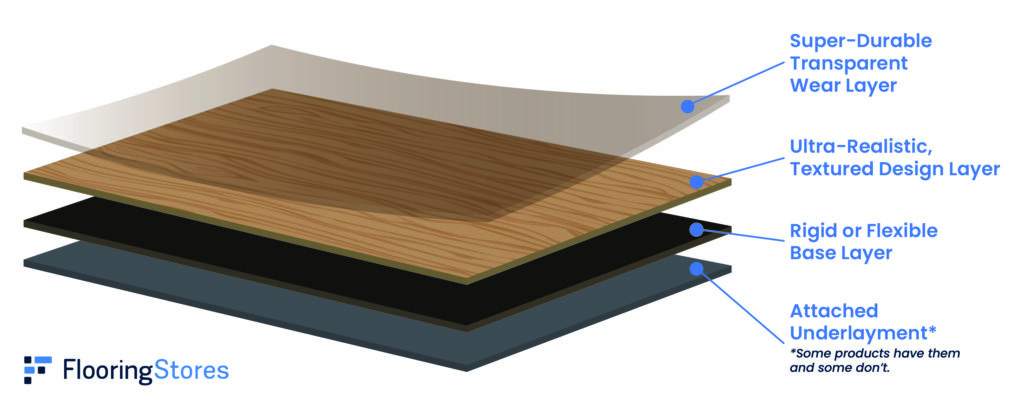
Some vinyl plank products are rigid, some are flexible, and some of the best vinyl plank brands include additions in their wear layers for extra protection or attached underlayments for enhanced underfoot feel.
Vinyl Plank, LVP, LVT, WPC, and SPC: What’s the Difference?
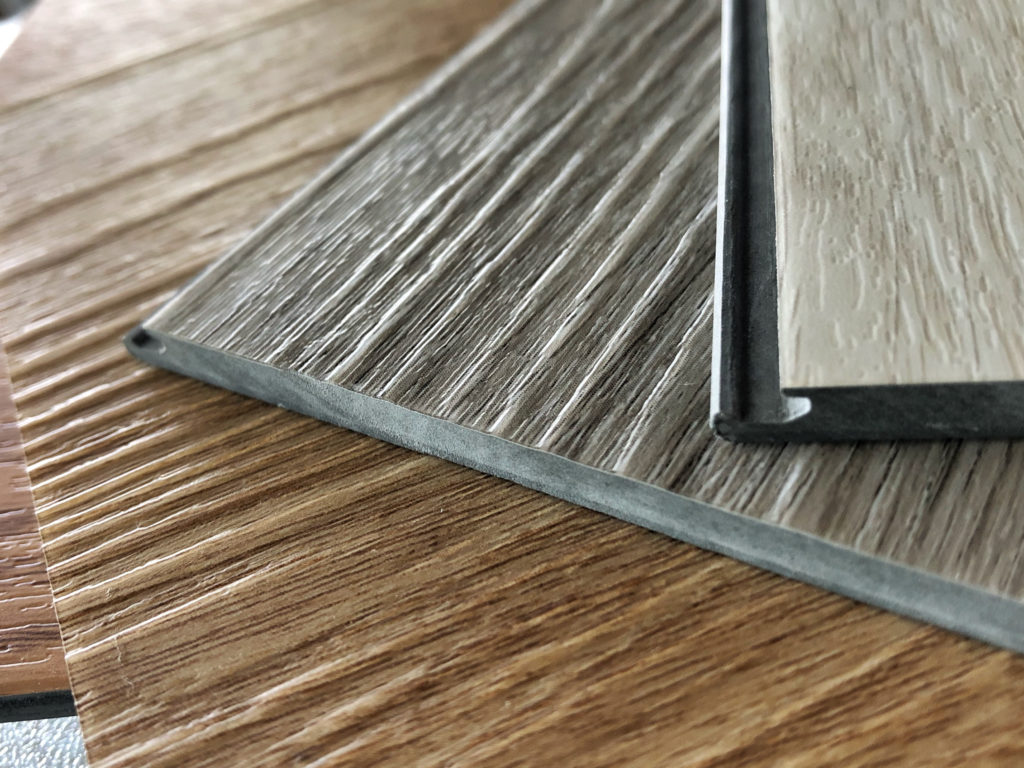
You’ve probably read these initials before and wondered what the heck they mean. What’s the difference between vinyl plank and LVT? Where does WPC come in? We know, it’s a lot.
Here’s the easiest way we can explain it. “Vinyl plank” is a catch-all phrase that differentiates it from the vinyl sheet flooring of yesteryear.
Things that fall under the “vinyl plank” category include LVP, LVT, WPC, and SPC. But to make things even more confusing, people sometimes use the terms “LVT” and “vinyl plank” interchangeably.
For our purposes, we’re calling all modern vinyl products (aka not vinyl sheet) “vinyl plank” or “LVP”.
PS: “EVP flooring” is just another term for rigid vinyl plank.
LVP vs. LVT
Luxury Vinyl Plank (LVP) and Luxury Vinyl Tile (LVT) are marketing terms designed to elevate modern vinyl flooring above the decaying stuff in the kitchen of your first apartment.
The significant differences between them are the design layer and shape.
- LVP is generally wood-inspired and comes in the same dimensions as other wood or fake wood planks. This includes both the classic thin strips, and also floors that mimic wide-plank wood flooring.
- LVT is typically stone-inspired and often comes in 12×12 and 12×24 inch tiles. The best vinyl plank flooring brands will attach prefabricated mock-grout for added realism.
WPC vs. SPC
Wood Polymer Composite (WPC) and Stone Polymer Composite (SPC) are two popular types of rigid core luxury vinyl flooring. The “wood” and “stone” in WPC and SPC refer specifically to their core or base layers.
- WPC flooring incorporates fine, filtered sawdust called “wood flour” into its core layer to increase soundproofing, comfort, and insulation. Generally, WPC is better for domestic use. And you don’t need to worry about waterproofing—the sawdust is encased in the vinyl.
- SPC flooring has the same idea, but the core contains limestone instead of wood. SPC is thinner and more rigid, making it great for high traffic areas and commercial applications. Think an SUV on a showroom floor, or a retail cart laden with books—SPC is perfect for uses like that.
How Much Does Vinyl Plank Flooring Cost?
How much does vinyl plank flooring cost? And how much does it cost to install vinyl plank flooring?
Let’s put it this way. Have you looked into the cost of installing carpet vs. laminate? Vinyl plank is cheaper than both. In fact, vinyl can be more affordable most other types of flooring—it just depends on which product you choose.
Average Vinyl Plank Flooring Costs (for Materials)
Vinyl plank flooring can cost anywhere from just over $1 to $10+ per square foot.
The average cost per square foot is $4, though we advise you to be cautious with any product that costs under $3/sq. ft.
These super-cheap offerings like Home Depot’s LifeProof vinyl flooring are not known for their quality. They wear out quickly and might off-gas harmful VOCs into your home.
The Average Cost to Install Vinyl Plank Flooring
Most vinyl planks are DIY-friendly. If you decide to use a professional installer, though, the price will largely be dictated by your location and needs.
All things considered, though, the average cost to install vinyl plank flooring professionally is usually between $2–$4 per square foot—just a bit less than the cost to install engineered hardwood floors.
How Do You Install Vinyl Plank Flooring?
Vinyl plank is some of the easiest flooring to install. Most of the best vinyl plank flooring brands offer products that can be installed in a number of ways. These include:
- Click-together floating floors. What is a floating floor exactly? It’s a surface that’s made of planks that snap and lock together like a high-tech jigsaw puzzle. Click-together flooring is held in place by the tight fit of these connections and “floats” on top of the subfloor.
- Glue-down floors. These surfaces are attached to the subfloor using industrial-grade adhesive.
- Loose-lay floors. These surfaces are made of heavier vinyl, usually with a rubber or rubber-type backing. They’re laid on top of a subfloor without any adhesives, and rely on their weight and friction to stay in place.
- Peel-and-stick floors. These are probably the easiest to install from a DIY standpoint—all you need is a utility knife, measuring tape, a chalk line, and patience. Think of them like a vinyl version of peel-and-stick carpet tiles.
However: by and large, the majority of vinyl plank flooring is either clicked together as a floating floor or glued down to a subfloor.
What’s the Best Way to Install Vinyl Plank Flooring?
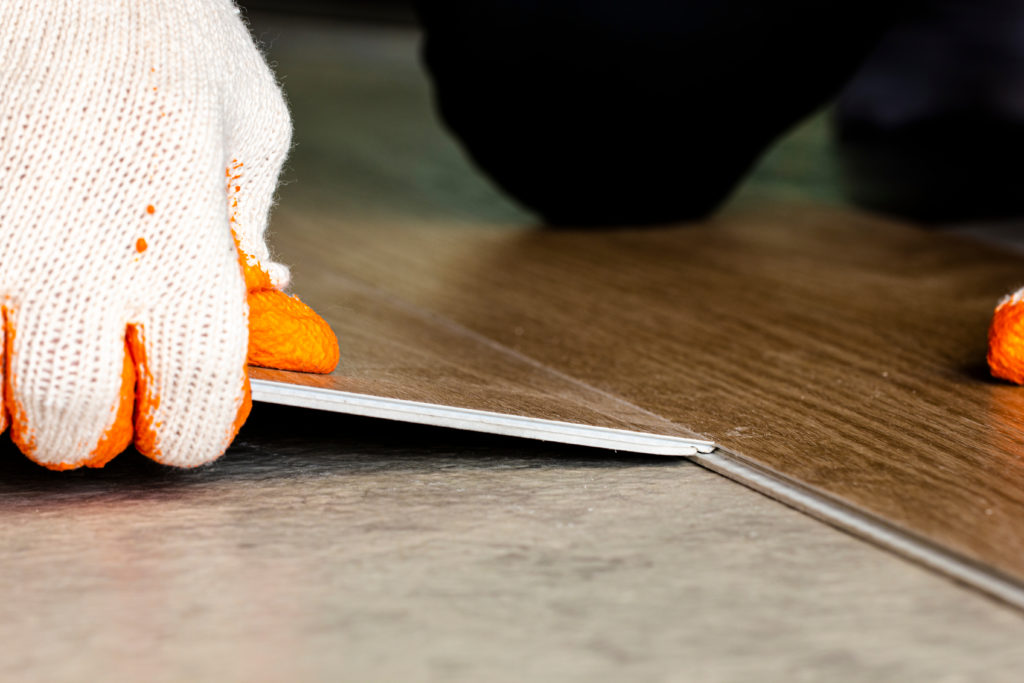
That depends on you! The function of the space usually decides the installation method.
For instance, glue-down could be beneficial for retail areas that see heavy traffic, while click-together floors are preferable for homes and apartments. As long as it’s flat, dry, and clean, you can install vinyl over anything.
How to Identify High-Quality Vinyl Plank Flooring
The best types of vinyl flooring share the same general construction.
Stacked from top to bottom, vinyl planks feature a wear layer, a design layer, and a core layer. So how do you identify high-quality vinyl plank flooring? There are a few different ways.
Look for a Thicker Wear Layer
You only need to know two measurements when shopping for vinyl floors:
- Millimeters measures the entire board’s thickness, and
- Mil, which measures the thickness of the wear layer. (For our fellow nerds out there, mil equals a thousandth of an inch).
The thicker the wear layer, the more durable the floor—although this advice is the same no matter what type of flooring you buy.
If you’ve compared vinyl plank vs. laminate, you’ll know that both products benefit from a thicker wear layer. The best engineered wood flooring brands are differentiated by their thicker wood veneers. The same goes for the best vinyl plank flooring brands, too!
How Thick Should a Vinyl Plank Wear Layer Be?
For an area with a lot of traffic, we’d recommend a wear layer of 20mil or thicker. For low-key spaces (like bedrooms or dining rooms), 12mil should be fine. Anything lower might last you about as long as a t-shirt from H&M.
For comparison sake, factories, hospitals, and schools use 22mil–40mil wear layers. The odds are good that the same LVP can handle your hyperactive Tibetan Mastiff!
Just Remember: Not All Wear Layers Are Created Equal!
It’s important to remember, though, that not all wear layers are the same. And here’s where it gets tricky—because not all of the best vinyl plank brands make their wear layers the same way.
Some wear layers offer UV protection; others incorporate different materials; it all depends on the manufacturer. In general, though, you have 4 main categories:
- Vinyl-Only: These wear layers offer the least amount of protection, as vinyl isn’t inherently scratch-proof. It doesn’t matter how thick a simple vinyl wear layer is—it still won’t be particularly durable.
- Polyurethane: These wear layers offer a good deal more protection; polyurethane is extremely durable and used to protect many different types of flooring.
- Polyurethane with Aluminum Oxide: These wear layers incorporate a super-hard crystalline coating—aluminum oxide—for extra durability.
- Polyurethane with Ceramic Bead Technology: These wear layers incorporate tiny beads that essentially act as ball bearings—ensuring that materials slide on the surface rather than gouging it.
Again, these categories are very general, and many manufacturers put other materials into their wear layers (like cultured diamonds, for instance).
But overall, polyurethane wear layers are much more durable than simple vinyl wear layers—especially when they have aluminum oxide or (even better) ceramic bead technology.
Either way, it’s important to ask your local flooring dealer about wear layers before you purchase. Even if you have a super-thick wear layer, it might turn a milky white when scratched if it’s low-quality.
Look for Attached Underlayments
Many of the best vinyl plank flooring brands will add extra layers to their products to increase comfort, durability, etc.
For instance: you might find an attached cork underlayment on a product for a better underfoot feel. This can give you the springiness of cork (which is great for sore joints) without any of the disadvantages of cork flooring on its own.
Look into these extra layers—they’re often a sign that the manufacturer is trying to do away with the inherent disadvantages of vinyl plank flooring (which we’ll mention below) and offering a superior product.
The Advantages of Vinyl Plank Flooring
There are tons of reasons to gravitate towards vinyl plank flooring. On that note, let’s have a look at some advantages the best vinyl plank flooring brands have to offer.
Even The Best Vinyl Plank Flooring Brands are Relatively Affordable
Sure, high-quality vinyl costs more—even as much as certain hardwood species. But by and large, vinyl plank flooring is very affordable.
For example: if you wanted to install mahogany or tigerwood floors, you would be paying nearly $20/square foot without installation. And we’re not even talking about buying from the best hardwood floor brands here, either.
On the other hand, you could get tigerwood or mahogany-look vinyl from one of the best vinyl plank flooring brands at $10/sq. ft. And those floors feature a 30mil-40mil wear layer, a lifetime warranty, and an impeccable design.
High-Quality LVP is Stunning
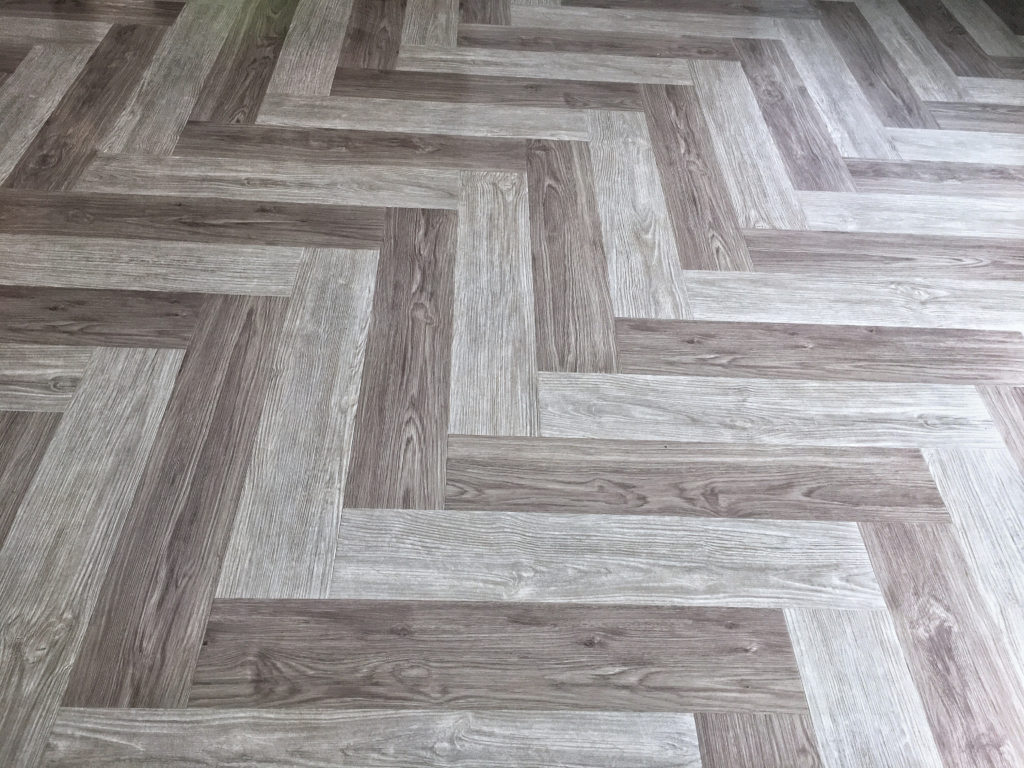
You can buy vinyl planks to mimic almost any material—and high-quality vinyl plank is gorgeous. Quality wood-look LVP, in particular, is amazingly accurate. Even experts have a hard time telling products from the best vinyl plank brands apart from the real thing!
It’s all thanks to 3D printing and a fancy industry technique called EIR (or Embossed-In-Register). EIR is a manufacturing technique that uses actual wood or stone to stamp textured patterns into vinyl planks for maximum realism.
You can find EIR-produced boards that look like different types of wood flooring, different types of floor tiles, you name it. Install it as-is, or use it to create ornate wood floor patterns—the choices are endless!
Vinyl Plank Flooring is Extremely Durable
Vinyl plank is one of the most durable, scratch-resistant flooring options available. Especially if you buy a product with a wear layer of 20mil or thicker!
Plus, some of the best vinyl plank flooring brands “take it up to eleven” by infusing their wear layers with ceramic, titanium, and even cultured diamonds. That’s seriously durable.
If you’ve already done your research on the most durable wood flooring varieties—or if you’re having a hard time choosing the best wood flooring for dogs—LVP is an excellent alternative.
Vinyl Plank is Waterproof
Let’s say you’re pining for a wood floor bathroom. You’ve probably looked into the pros and cons of teak flooring, searched high and low for water-resistant wood flooring options, and even perused waterproof laminate options like RevWood.
But at the end of the day, the fact is this: 100% waterproof hardwood flooring does not exist. Not from the best hardwood floor brand, not from Home Depot, not from the guy named Jimmy selling wood out of the back of his truck down the street.
The closest you’re going to get is a waterproof wood hybrid that mixes wood veneers with a vinyl core.
But don’t despair: vinyl plank can do it all—and more. Unless you want to opt for concrete flooring that looks like wood, luxury vinyl plank is, hands down, the best waterproof wood-look option there is. That’s just a fact.
It’s Cheap and Easy to Install (for Pros and DIY-ers)
As we mentioned above, LVP is cheap and easy to install. That’s because click-together and peel-and-stick setups are friendly both for the pros and for seasoned DIY-ers. Plus, many of the best vinyl plank flooring brands offer built-in underlayments to make installation even easier.
Why is this important? Well, aside from saving you money (and who doesn’t want that), the flooring industry is currently facing a monumental installer shortage. This is driving up prices and making it harder and harder to find reputable flooring installers.
That’s why it’s more important than ever to have an easy-to-install product—especially if you’re shopping on a budget.
And if you need that product to be waterproof, installation becomes even more important! Tiles need to be properly grouted (even snap-together tile flooring), and if they aren’t, goodbye waterproofing!
It Offers Endless Versatility
Vinyl plank can look like anything, and you can install it anywhere in the home. Translation: you can have your cake and eat it too!
Do you want the look of pine in your kitchen? If you know anything about the pros and cons of pine flooring, you’ll know that’s a terrible idea. Pine is way too soft to be a good kitchen floor. But with LVP, it’s possible! The top vinyl plank flooring brands have plenty of pine inspired choices.
Vinyl lets you get any look you want, wherever you want it. No looking up “the best hardwood floor brands for humid climates”, no searching “can I put maple flooring over concrete”. Just endless versatility!
It’s Super Low-Maintenance
Sick of watching YouTube videos on cleaning hardwood? Never want to refinish bamboo flooring ever again? We hear you.
Rather than opting for a wood, bamboo, or tile product, just put in vinyl. All you need to do in order to keep it clean and long-lasting is a regular sweeping and vacuuming routine. You don’t even need a no-shoes policy!
Fun fact: tedious upkeep like refinishing, waxing, and polishing will actually damage your vinyl floors. The same goes for specialty chemical floor cleaners. A dollop of mild dish soap is all you need to protect your floors.
Just beware of vacuums with a rotating brush, or “beater bar.” These can scuff up your wear layer!
Vinyl Plank Feels Great Underfoot (Especially WPC)
If you can’t decide between carpet or hardwood in the bedroom, you’re probably looking for something cozy underfoot and pleasing to the eye. If so, vinyl could be a good compromise.
And if standard LVP is a good compromise, WPC is a great one.
As we mentioned earlier, WPC has a core that contains wood flour. Most vinyl has a bouncy feel underfoot, but WPC takes that cushion factor to the next level. This is a huge bonus for people with joint pain.
It Also Improves Insulation
The same qualities that give WPC vinyl its softer feel also improve its insulation. Your run-of-the-mill vinyl plank will maintain room temperature. But WPC will actually insulate your floor! It can even be safely installed over radiant heating systems.
Your utility bill will thank you.
Some of the Best Vinyl Plank Flooring Brands Offer Sound-Dampening Products
That’s right—many of the best vinyl plank flooring brands offer products that dampen and reduce sound throughout the home.
WPC products, in particular, excel at this. Just another reason vinyl is a great choice for children’s playrooms, 2nd-floor bedrooms, music rooms, home offices, or any other place you want to manage noise levels.
Luxury Vinyl Plank Offers Unlimited Style Options
We know we’ve been over this. But vinyl can seriously look like anything. Anything.
We’ll stop talking about it after this. Promise.
But: not only can LVP imaging mimic any wood species, but it can also match any wood floor colors imaginable. Ash flooring? Easy. Ebony flooring? No problem.
The same goes for stone, textiles, ceramic, psychedelic patterns, pictures of your pet llama, and yes: even vinyl.
The Disadvantages of Vinyl Plank Flooring
While we absolutely love vinyl plank flooring, it does have a few disadvantages. But the same can be said for any type of flooring. There are tile disadvantages, carpet disadvantages, even engineered wood disadvantages.
That said, issues like resale value, longevity, and environmental impact are essential to keep in mind when choosing the best vinyl planks for your application. So let’s have a look at some disadvantages of vinyl plank flooring:
Even the Best Vinyl Plank Flooring Brands Aren’t Particularly Low in VOCs
When it comes to environmentally-friendly flooring, vinyl isn’t exactly at the top of the list. Even products sold by the best vinyl plank flooring brands aren’t guaranteed to qualify as low-VOC flooring.
Why? Vinyl made of plastic—and almost all plastic can off-gas VOCs!
However: the flooring industry is really improving when it comes to indoor air quality. And these days, there are a number of low-VOC vinyl flooring choices available that are FloorScore-certified, CARB2 compliant, and phthalate-free. These certifications can help you guarantee that you’re getting a healthy, non-toxic product for your household.
Our advice? Always check for third-party environmental certifications. Or better yet, ask your local flooring store for their top low-VOC flooring picks.
And Vinyl Isn’t Great for the Environment
More than any other type of fake wood flooring, vinyl can be a real bummer in the eco-friendly flooring department.
Plastics like vinyl are hard to reuse. And the majority of vinyl plank flooring brands use adhesives and hardening agents that make their products impossible to recycle. So they often end up in landfills after you remove them from your home.
Plus, plastics are created using crude oil—which isn’t the most environmentally-friendly thing either.
Some environmentally conscious vinyl plank flooring brands like Cali Bamboo and Forbo are taking extra steps to make vinyl easier to recycle. But these manufacturers are a fraction of the market.
Some Recycled Vinyl is Bad For Your Floors
Why is it a bad thing to put recycled vinyl in new products? Because there’s no way to be sure of the VOC levels in recycled content.
Even worse, rumor has it that vinyl with recycled content can crumble and break.
As a result, many of the best vinyl plank flooring brands advertise the absence of recycled content—marketing their products as containing “100% virgin vinyl” (aka pure plastic). Which is—let’s face it—a bit of an oxymoron for anyone with sustainability at the top of their priority list.
Cheap Vinyl Planks Can Create Health Risks
We’re all familiar with VOCs at this point. Buying from the best vinyl plank flooring brands is a simple solution to avoid contaminating your home.
Again, It’s challenging to find safe vinyl planks in big box stores like Lowes or Home Depot. We get it: the price and convenience are tempting. But the benefits may not outweigh the risks.
If you want to make sure the vinyl planks you buy are safe, check the box. Just like non-toxic laminate flooring, your vinyl planks should be FloorScore-certified as low-VOC. Better yet, contact the manufacturer and ask them to back up their claims.
You can also check the EPA website, a useful source for technical information and statics. They even have a brand-specific database.
Just remember: when it comes to flooring, you get what you pay for. So if you want the safest, most highly-tested, highly-certified product… it’s going to cost more than the stuff you buy off the street. Or at the box store.
Some Vinyl Plank Can Fade in the Sun
Sun fading is a potential problem to be aware of, but not an issue to lose sleep over. The truth is, most floors are susceptible to sun fading. Wood floors get sun-bleached, as does laminate, and discoloration can be one of the most significant issues with cork floors.
Depending on the quality, vinyl ranks somewhere between laminate and cork when it comes to UV susceptibility. Maybe LVP isn’t the best choice for sunroom flooring, rooms with floor-to-ceiling windows, or big skylights—but it can pretty much go anywhere else.
Of course, it all depends on the specific product. Many top vinyl flooring brands offer wear layers with built-in UV protection!
You Can’t Refinish Vinyl Planks (and They Can Be Hard to Remove)
Unless you’re willing to live with an eyesore, you have to replace damaged vinyl planks. There’s no way to sand down and refinish plastic!
Unfortunately, it can be difficult to remove glue-down or click-together vinyl planks. Glued-down planks need to be chiseled out without damaging their neighbors—which is no easy task.
And click-together floors need to be unclicked, plank by plank, all the way from the wall to the damaged plank! That can be a hassle.
Most how-to videos on vinyl plank repair will assure you the process is easy. Then, they show you a video of a professional effortlessly replacing the damaged plank. The reality is, for most people, floor repairs aren’t easy. Unless you’re a committed DIYer, finding a top-rated flooring expert is a comparatively stress-free option.
Flexible LVP Needs A Flawless Subfloor
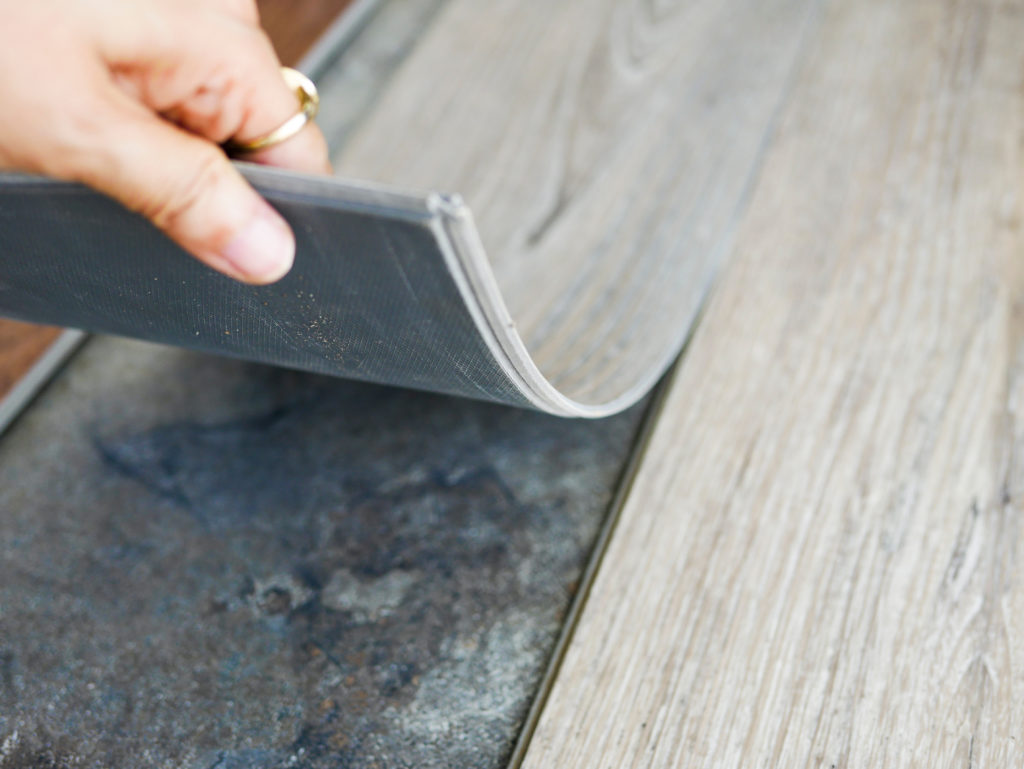
What is subflooring? It’s the wood or cement surface beneath your floors. An ideal subfloor is clean, dry, and level.
The list of potential problems associated with wonky subfloors is long. All you need to know is this: cheap vinyl is going to show any imperfections underneath. This is especially true when it comes to flexible vinyl planks, since they will mold themselves to the surface below.
Fortunately, many of the best vinyl plank brands have built-in underlayments to improve comfort and hide minor subfloor imperfections (which we’ve already mentioned).
Cork underlayment also allows you to lay your new vinyl plank over existing floors, saving you time and money on tearing out the old stuff.
Vinyl Has A Shorter Lifespan Than Solid Hardwood
Nothing is going to last as long as well-maintained solid hardwood, because it can be refinished indefinitely! But if you wanted to invest in hardwood, you wouldn’t be shopping around for hardwood floor alternatives like vinyl—you’d be researching the best hardwood flooring brands.
That said, vinyl is way easier to maintain once installed. And it can come with a lifetime warranty. But if you’re looking for a floor that will last generations, you might want to look into solid hardwood. Something to keep in mind if you just bought your dream home!
DIY Vinyl Installation On Intricate Floor Plans Takes Nerves Of Steel
If an easy DIY installation led you to choose vinyl, it’s a good idea to evaluate your floor plan. Tons of little nooks and crannies can drive you nuts. And notching out a bunch of corners or undercutting a maze of doorways just plain sucks.
If your house looks like a bad game of Tetris, and you’re determined to push forward anyway, most pro installers recommend you buy extra materials and lay them out before installation.
Godspeed, friend.
Other Flooring Options May Offer Higher Resale Value
No matter how gorgeous your floors look, some potential buyers might turn up their noses at vinyl flooring. Although most people recognize the benefits (and value) that the best vinyl plank flooring brands have to offer, others don’t.
On one hand, vinyl plank flooring has been shown to increase resale value—on average. But like anything else, this is on a case-by-case basis. And first-time buyers have yet to lose sleep over a hardwood refinishing bill or watch in horror as their kid’s soccer team stomps through the house in cleats.
If durability is your top priority, keep it classic to protect resale value. Or if the room is low-traffic, opt for a floating floor. And if a new buyer balks at your vinyl, you can explain how easy it is to remove.
Fun fact: a common disadvantage of hickory flooring is that some buyers don’t like its grain pattern. So, it’s sometimes said to “decrease resale value”. But we think that’s crazy—hickory is gorgeous and the most durable American hardwood there is. It just goes to show that personal preference can play a huge role in determining resale value.
Floating Floors Can Present Accessibility Concerns
Accessibility concerns are a common disadvantage of floating floors in general, and vinyl floating floors are no different.
Rolling loads like wheelchairs, mobility devices, home office chairs, and skateboards (seriously, this happens) can cause floating floors to shift and rigid boards to snap. Wheels can get stuck in grooves. And most warranties won’t cover these issues.
Thankfully, accessibility concerns don’t rule out vinyl. A glue-down installation is the best solution, but make sure to investigate VOC levels in whatever adhesive you choose.
The Best Vinyl Plank Flooring Brands (Plus Products, Pricing, Warranties, & Reviews)
Now that we’ve mastered the pros and cons of vinyl plank flooring, let’s move on to the main event: taking a look at the best vinyl plank flooring brands on the market.
For quality’s sake, we won’t list any products that have a wear layer under 12mil. That said, if a 12mil+ wear layer isn’t in your budget, we won’t leave you hanging—the “Notable Brands” section below lists more affordable options.
#1. Proximity Mills
The Best Overall Value | $3.50–$7/sq. ft.
Coming in at number one, we have Proximity Mills!
There are a lot of reasons we’ve ranked this brand at the top of the list. But more than anything, we think they offer the best overall value for the price (and Proximity Mills reviews seem to agree).
What makes Proximity Mills’ vinyl plank stand out? Well, according to the company, it’s made by the same manufacturers that produce LVP for a bunch of the higher-end brands below. But: Proximity Mills distributes their products directly to flooring stores, so they skip a bunch of the middlemen—essentially selling high-end floors at a not-so-high-end price. We kinda think of them as the Warby Parker of flooring.
Plus—they’re super into sustainability, environmentalism, and shopping local, which we think is fantastic. And there are a bunch of other perks to this company that we’ll get into below.
Overall, their high-quality products, brand ethics, and commitment to customer service all stand out.
Proximity Mills’ Vinyl Plank Offerings
Currently, Proximity Mills offers 11 collections of LVP, with 5–10 styles per collection. And the brand reps we talked to said those offerings are going to be expanding in the near future.
All of Proximity Mills’ products feature a super-durable SPC core. They come in both wood-look and tile-look varieties (with lots of plank sizes to choose from), and depending on the collection, they can be installed as glue-down, loose-lay, or floating floors.
Oh, and fun fact: Proximity Mills uses a proprietary color-coded icon system to make their products easier to compare. And we’re told that when the company rolls out more types of flooring in the future, that system is going to carry over.
- With its 22-mil-thick, UV-resistant, ceramic-bead-infused wear layer, Yukon River is probably our favorite Proximity Mills wood-look floor. And holy moly is it pretty.
- Ohio River (yeah, all the company’s collections are named after rivers) is similarly durable—and it comes in mixed-width options, too.
- When it comes to realism, Salmon River takes the cake. Its EIR (embossed-in-register) surface doesn’t just look exactly like wood—it feels just like it as well.
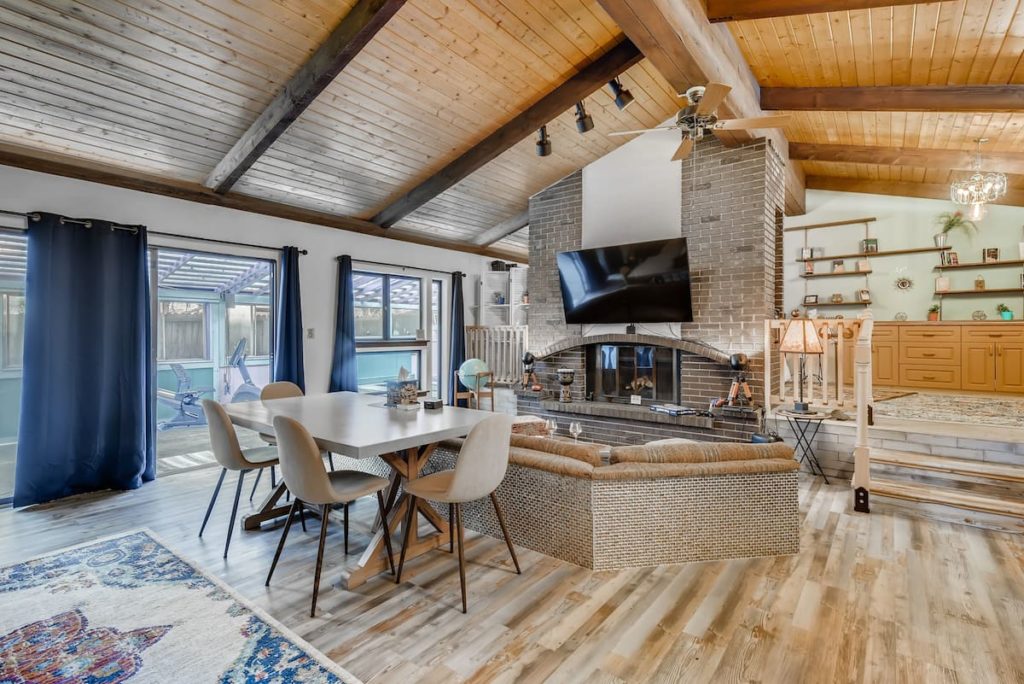
Proximity Mills Vinyl Plank Flooring Construction
Like we said, all of Proximity Mills’ current offerings feature an SPC core, multiple installation options, and hyper-realistic visuals. The only caveat here: only their loose-lay products come with a built-in underlayment, so keep that in mind when you’re making your buying decision.
As we mentioned in our Proximity Mills review, though, the company is pretty up-front about not providing built-in underlayments. And in their defense, all-in-one underlayments don’t exactly have the best reputation for quality.
But again: it is definitely something you’re going to want to consider based on your situation.
Proximity Mills Vinyl Plank Durability
Here’s where the company starts to set itself apart. All Proximity Mills LVP floors come with a wear layer between 12 and 22 mils thick. And every one of those wear layers is UV-resistant and ceramic-bead-infused (and if you skipped that part of this article, here’s why that’s important).
So: is it possible to scratch or dent their products? Sure. Is it easy? No. And believe us—we tried.
Proximity Mills’ Vinyl Plank Warranty Coverage
Every Proximity Mills floor comes with a standard lifetime limited warranty.
As far as commercial warranties are concerned: one collection offers a 5-year warranty, one collection offers a 7-year warranty, and the other 9 collections all offer a 10-year warranty.
That might not seem super impressive compared to some of the high-end brands below, but if you compare it to anything else in the price range—Lowes’ SmartCore flooring, for example—it’s pretty excellent.
Proximity Mills Safety Rating: 10/10
Proximity Mills is the only brand on our list to score a full 10/10 safety rating. Why?
Every one of their floors is FloorScore-certified as either low-VOC or fully VOC-free. Zero-VOC floors are not common in the world of LVP, even among the best vinyl plank flooring brands.
And: every one of Proximity Mills’ floors is at least partially recyclable, which is also unusual for LVP producers. Like we said above, the company is committed to sustainability.
Finally, according to their brand reps, Proximity Mills only works with manufacturers that meet their standards for ethical labor and business practices. That’s not always something that can be said for lots of the bigger brands out there.
Which Proximity Mills Product Provides the Best Value?
Honestly? We’d say all of them. Here’s the thing though: Proximity Mills products are a bit difficult to actually find.
Part of that has to do with the company’s commitment to quality, but part of it is because Proximity Mills only allows certain stores to carry their products.
Why? According to the company, it’s a customer satisfaction thing. Apparently, they only want smaller stores that meet certain criteria for installation knowledge, customer service, and so on to sell their vinyl planks.
We get that (and we applaud their commitment to supporting small businesses and shopping local) even if it doesn’t seem like a great business strategy to us. But hey, to each their own.
Where Can I Purchase Proximity Mills Vinyl Plank?
While most of the other brands on this list can be purchased at just about any flooring store (or box store), you will have to hunt a bit for Proximity Mills.
#2. Doma
The Most Stylish LVP on the Market | $4.25–$10.40/sq. ft.
When we say that Doma offers the most stylish LVP options on the market, we’re not exaggerating. The word that comes up again and again on the company’s website is “bold”—and that’s exactly how we’d describe it, too.
Lots of (heck, most) LVP brands offer a very similar catalog of looks—oak, hickory, maple, etc.
Doma, on the other hand, offers perhaps the best collection of tile and non-standard wood looks of any brand on this list. And holy moly are they pretty! We’re talking different colors, exotic species like pecan, you name it.
Translation: if you’re looking for hyper-fashionable LVP that’s different from anything else around, this is the brand for you.
Doma’s Vinyl Plank Offerings
Doma offers 7 collections of luxury vinyl plank flooring in both wood and tile looks. All of these products are made to be installed as floating or glue-down floors (or in some cases, either), depending on the collection.
While there don’t seem to be any major differences between the various collections in terms of performance, it is worth noting that Doma makes good on its tagline—“where fashion meets flooring”—by offering some of the widest LVP planks around at a whopping 9 inches. Talk about embracing the wide-plank trend!
Additionally, it’s worth noting that some of Doma’s tile-look products are even offered in a (surprisingly large) 12-by-24-inch format for added oomph.
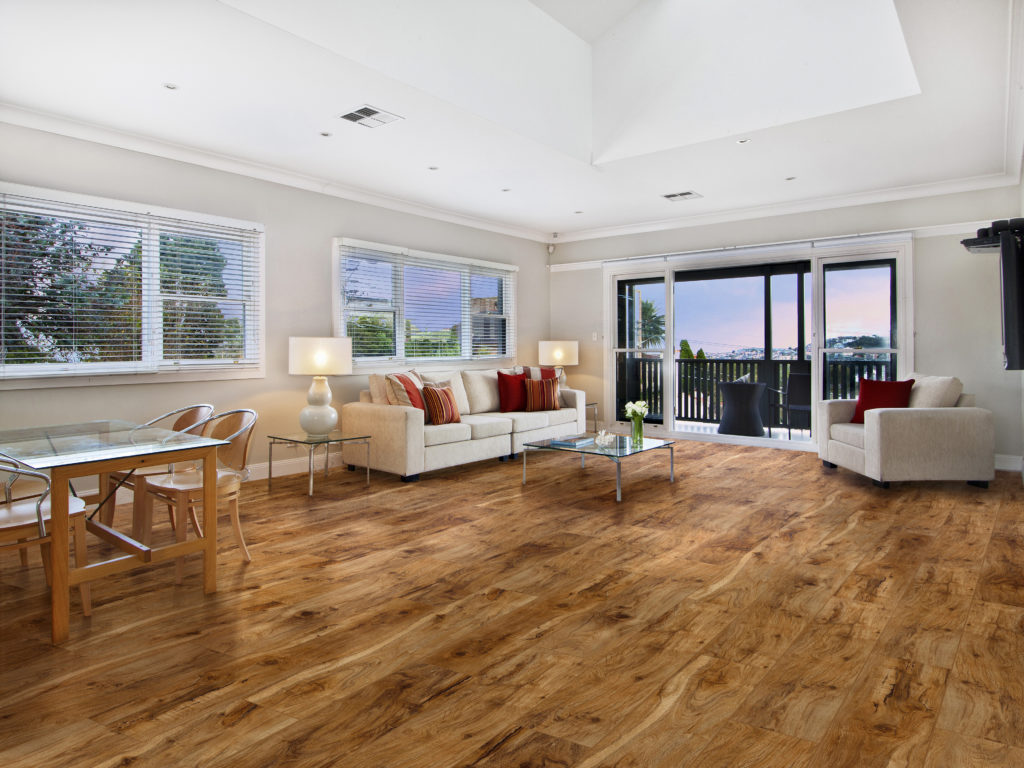
Doma Vinyl Plank Flooring Construction
All Doma LVP floors boast high-strength SPC cores and come in multiple finish options.
Plus, all Doma vinyl floors also include built-in underlayments—which saves you the trouble of shopping for (and shelling out the cash for) a separate vinyl flooring underlayment once you’ve purchased your actual floor.
Doma Vinyl Plank Durability
Wear layers on Doma LVP products range between 12mil and 22mil, depending on the collection.
However, Doma actually does something interesting when it comes to their wear layers. Rather than offering one single type of wear layer, they offer two:
- Polyurethane with Aluminum Oxide (which is, as we mentioned above, one of the most durable wear layers around)
- Antimicrobial Polyurethane
This second option isn’t particularly common—basically, it’s a polyurethane finish that’s been infused with something like Microban. If antimicrobial cleanliness is important to you and your family, it’s a great option.
Doma’s Vinyl Plank Warranty Coverage
With the exception of one collection, all Doma vinyl plank flooring products come with a limited lifetime warranty.
Commercial warranties vary a little more—some collections don’t carry them, while others have commercial warranties up to 15 years. While that might not compare favorably to a uber-high-performance product like Proximity Mills, it’s still pretty impressive compared to many other brands on this list.
Doma Safety Rating: 10/10
All of Doma’s LVP products are FloorScore-certified, GreenGuard Gold-certified, or both.
Translation: they’re super-duper-certified as low-VOC. Even more impressive? Some collections are even VOC-free. And many of Doma’s LVP collections are recyclable!
Like we said before, VOC-free products and recyclability are not common—even among the best vinyl plank flooring brands.
Which Doma Product Provides the Best Value?
Given that Doma’s collections are separated by look rather than by different product features, it’s hard to say that one is any better than another.
Still, we really love the look of Timberland in Pecan—it’s probably one of the boldest (see?) looks we’ve seen in the world of vinyl flooring…maybe ever?
Where Can I Purchase Doma Vinyl Plank?
Unfortunately, you will have to hunt for Doma a bit—it’s not carried at box stores or similar nationwide retailers. We’d recommend taking a look at their “find a retailer” page to see who sells it near you.
#3. Newton
The Best Budget Option | $2.00–$4.80/sq. ft.
We know: the word “budget option” probably conjures up some pretty negative thoughts, and rightly so. But Newton is changing the way people think about budget-friendly flooring, and their vinyl plank products demonstrate why.
We’ll be honest here: if you’re looking for a last-two-lifetimes-durable, one-of-a-kind-trendy floor, Newton’s LVP probably isn’t what you’re looking for. But in many cases, that’s not what a lot of us are looking for.
So if what you need is a super-solid floor, at a value price, and you can live without all the bells and whistles—well, you’re not going to do much better than Newton’s LVP.
Newton’s Vinyl Plank Offerings
Newton sells 10 different lines of vinyl plank flooring, all of which come in wood looks.
That said, there’s a good bit of variation between the different collections in terms of appearance, so you’re not saddled with the classic “different shades of oak” options that have become so standard with today’s vinyl plank flooring brands.
Additionally, some collections boast a built-in underlayment, which is relatively impressive at the price point.
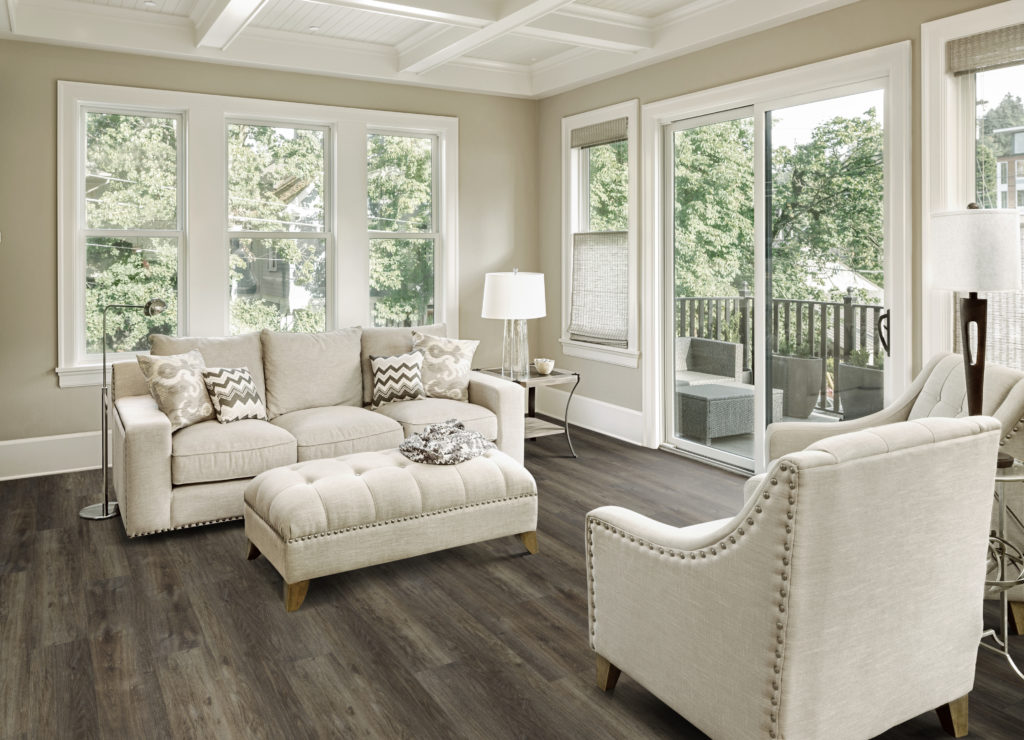
Newton Vinyl Plank Flooring Construction
From Newton’s website, it appears that all but two of the company’s LVP products have an SPC core. If you were wondering, this is one of the big reasons we ranked Newton so highly on this list—SPC products at this price are rare.
Similarly, it seems that all but two of these products are made to be installed as floating floors; the two remaining ones are glue-down (and interestingly, they’re the only ones that don’t have SPC cores).
Newton Vinyl Plank Durability
All of Newton’s wear layers are made of polyurethane infused with aluminum oxide. Again, these are way tougher than the ordinary vinyl wear layers you’d see at this price, and they range from 8 to 20 mils thick.
Translation: they’re all suitable for heavy residential traffic.
Newton’s Vinyl Plank Warranty Coverage
Most of Newton’s LVP collections come with a limited lifetime residential warranty; the rest come with a 15-year residential warranty.
As an added bonus, the majority of these vinyl collections come with a 10-year light commercial warranty as well. All in all, not bad at all for a “budget” product!
Newton Safety Rating: 9/10
All Newton LVP is FloorScore-certified as low-VOC, and certain collections are entirely VOC-free as well. Unfortunately, like most vinyl plank flooring brands, it can’t be recycled.
Which Newton Product Provides the Best Value?
We’d probably go with something from the Antiques collection, but that’s just because we love the look—you really can’t go wrong with any of these products. Newton reviews are pretty positive across the board.
Where Can I Purchase Newton Vinyl Plank?
Newton is another brand that’s not carried at big national box stores, so you will have to buy it at a local retailer. Here’s a map of flooring stores that carry it.
#4. Karndean
The Darling Of Professional Installers | $3.75–$9/sq. ft.
Karndean, based in the UK, distributes to Australia, New Zealand, the US, and (obviously) the United Kingdom. They focus solely on vinyl, and they do it well. Really well.
Karndean vinyl plank flooring has an excellent reputation with pro installers (always a good sign). Sure, it’s a little pricey for vinyl, but their products are gorgeous and last for decades.
Karndean’s patented LooseLay format is also well respected amongst the flooring community. LooseLay has a rubber backing that relies on friction to stay in place—an excellent option for set designers, party planners, or DIY fanatics because LooseLay is ridiculously easy to install and remove.
Karndean’s Vinyl Plank Offerings
Karndean offers 11 collections in three formats: rigid click-lock, glue-down, and loose-lay. All styles are either wood- or stone-inspired.
- At $3/sq. ft., Knight Tile is their budget option.
- Korlok, at $5/sq. ft., is their mid-range offering and sought after for a mix of value and durability.
- Art Select and Da Vinci are their high-end lines, typically selling for $8/sq. ft., but you can find deals online for $6/sq. ft. or less.
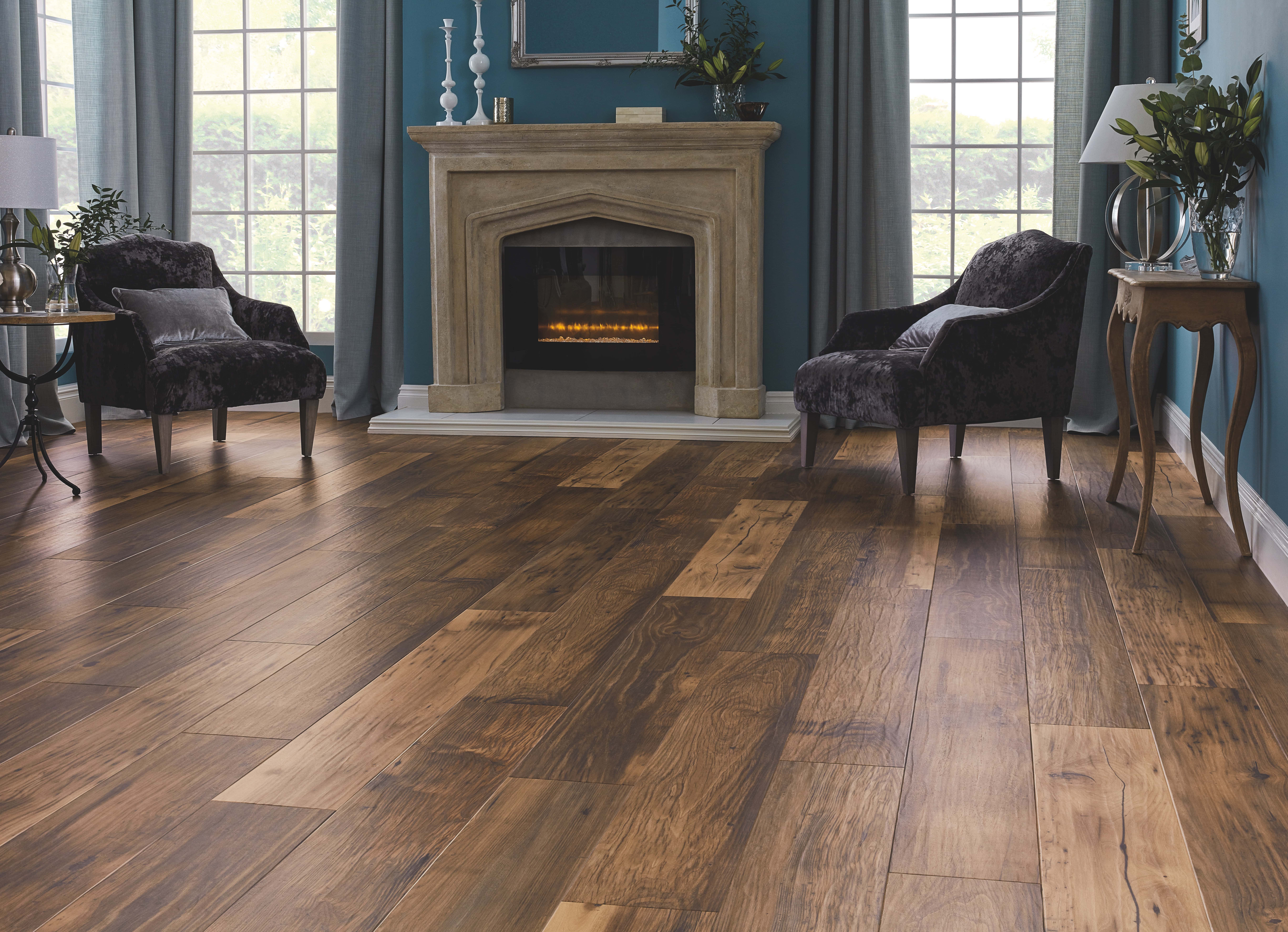
Karndean is classy-not-stuffy. They create timeless wood and stone varieties alongside bold, yet tasteful patterns.
Karndean Vinyl Plank Flooring Construction
Karndean LVT comes in a variety of dimensions to suit any space. Their rigid planks use a vertical click locking system (instead of a horizontal system like tongue-and-groove) that makes installation easy. They also offer glue-down or LooseLay installation.
An attached acoustic underlayment adds comfort and sound-dampening properties, so go ahead and rock those heels whenever.
Karndean Vinyl Plank Durability
The Knight Tile collection has a 12mil wear layer. Midrange collections like Korlok are 20mil, and the Art Select and Davinci lines sport a commercial-grade wear layer of 30mil, which is tough stuff.
Karndean’s Vinyl Plank Warranty Coverage
Karndean’s warranties, like most companies, fall in line with their durability standards.
All collections come with a lifetime residential warranty.
Knight Tile has a generous 10-year warranty for commercial applications. Da Vinci and Art Select commercial warranties cover you for 30 years. Everything else is 15 years.
Karndean Safety Rating: 9/10
Karndean advertises “100% pure virgin PVC” in their products to assure customers of low-VOC content. They also use adhesives without solvents to keep emissions low.
Which Karndean Product Provides the Best Value?
Korlok has a competitive cost-to-durability ratio, but the Art Select and Da Vinci collections look fantastic if you can find a deal online.
Where Can I Purchase Karndean Vinyl Plank?
Karndean’s LVP isn’t available through box stores, but it is widely available. Search for a retailer here.
#5. Shaw Industries
Brand Of All Trades. Master Of Many. | $5‑$10/sq. ft.
Fifty years ago, Shaw got their start dominating the carpet game. Now they make every hard surface covering you can imagine. Shaw isn’t just a big name in vinyl; they’re a trusted source for nearly all of the most durable wood flooring alternatives. They even make low-VOC carpet!
Shaw’s Vinyl Plank Offerings
Shaw’s vinyl range includes three collections and 74 styles.
- Duratru sheets are old-school vinyl with a new school image. The majority of styles sell for under $2/sq. ft., but only two have a 12mil wear layer.
- The Floorte and Floorte Pro collections are geared towards high-end residential or light commercial applications. Styles are priced ($5–$10/sq. ft.) according to the wear layer’s thickness (12mil‑30mil).
The significant difference is in the core construction.
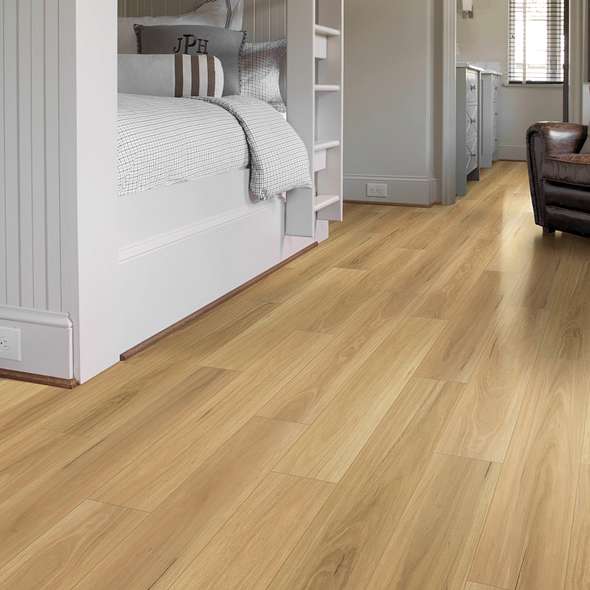
Shaw’s Vinyl Plank Construction
The Floorte line has a WPC (wood polymer composite) core, and Floorte Pro is SPC (stone polymer composite). Both options are finished with a wire brush to add texture.
Shaw specs their plank dimensions in a way that allows you to mix and match sizes to create a custom look—a unique feature among the best vinyl plank flooring brands. You can also use more than one color to add a little extra flair.
Shaw’s Vinyl Plank Durability
Be aware that only two styles in the Duratru line have more than a 12mil wear layer: Ares (12mil) and City Park (20mil). Again, 20mil is the baseline for commercial use.
As we mentioned above, the Floorte and Floorte Pro lines are 12mil–30mil (30mil is nearly bulletproof). As is the case with all vinyl plank flooring, the wear layer determines the price.
Shaw’s Vinyl Plank Warranty Coverage
Just as the wear layer reflects the price, the price reflects the coverage.
Generally, anything with a wear layer thicker than 12mil will be covered for 30 years (for residential products) and 5 years for commercial products.
Styles with 20mil wear layers or thicker will include a lifetime residential warranty and 10‑20 years for commercial installation.
Shaw’s Vinyl Plank Safety Ranking: 9/10
Some Shaw vinyl plank flooring is sourced from overseas. If you decide on one of their budget styles, it doesn’t hurt to contact the company and investigate VOC emission standards.
Which Shaw Product Provides The Best Value?
Anything in the Floorte lines between 12mil–20mil will give you the best durability-to-value ratio.
Where Can I Purchase Shaw Vinyl Plank?
Shaw is available at just about any store that sells flooring!
#6. COREtec
The Inventor of WPC | $6‑$12/sq. ft.
COREtec was formerly a subdivision of USFloors, which was bought out by Shaw in 2016. As a result, many critics compare COREtec Original, their most famous line, to Shaw’s Floorte Plus.
To be fair, COREtec vinyl planks feature elevated design layers and attached cork underlayment. Cork underlayment is one of the big clues pointing to the best vinyl plank flooring brands.
The main difference is value. COREtec’s vinyl plank will cost $1–$2/sq. ft. more than Shaw’s vinyl plank for the same wear layer thickness. But to be fair, COREtec flooring reviews are excellent.
COREtec’s Vinyl Plank Offerings
- COREtec Original (which replaced COREtec Plus as the company’s flagship product) costs between $7–$10.50/sq. ft. on average.
- COREtec Advanced+ (the company’s new SPC line) costs between $9–$10/sq. ft.
- COREtec Pro (formerly COREtec Pro Plus) can set you back anywhere from $5‑$8/sq. ft.
Oh, and side note: in some parts of the world, you may still see the company’s original product, COREtec One, being sold. This is a less expensive product that does not come with a cork underlayment, and it’s no longer distributed in the United States.
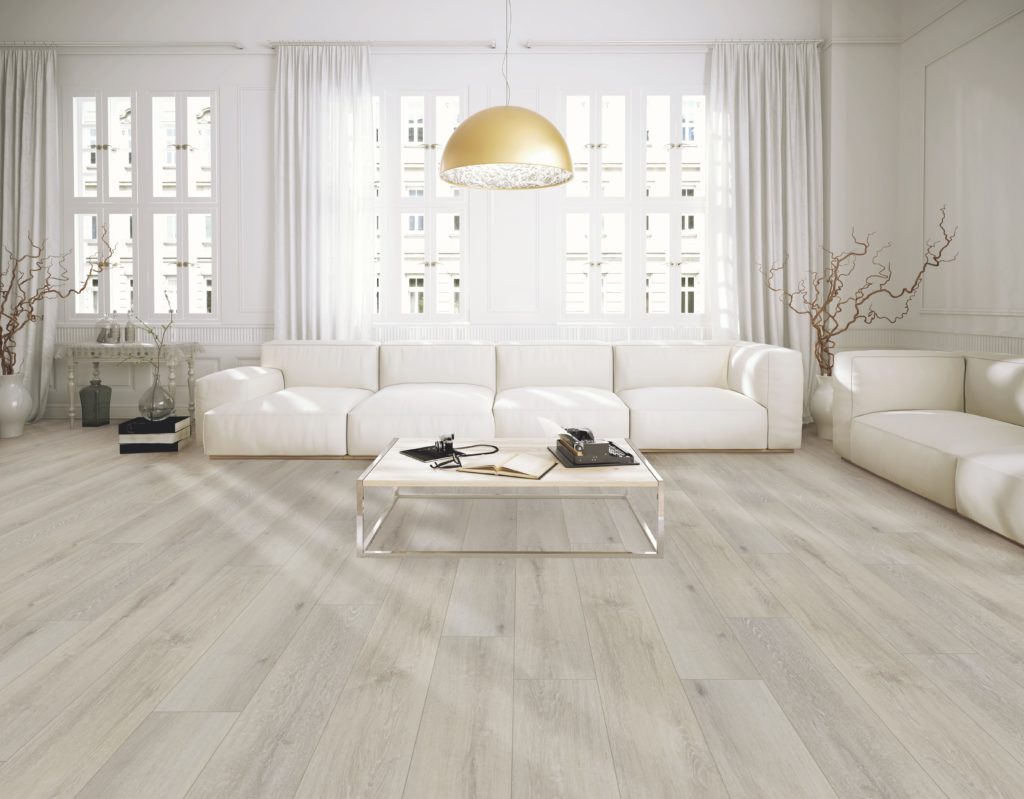
COREtec’s Vinyl Plank Construction
COREtec developed and patented the first waterproof WPC core. They’ve since expanded their production to include solid vinyl construction and SPC.
All three collections qualify as 100% waterproof vinyl flooring and feature an attached cork underlayment.
COREtec Original and COREtec Pro both have a commercial-grade, 20mil wear layer. COREtec Avanced+ does not have a wear layer thickness listed in its online product specs, but given its 15-year scratch-resistant warranty, we would wager it’s plenty thick. Expect a 12mil wear layer from COREtec One.
You can buy all of COREtec’s collections in a DIY-friendly, angled click-lock design.
COREtec’s Vinyl Plank Safety Ranking: 9/10
Since Shaw manufactures COREtec, you can expect similar safety standards.
COREtec’s Vinyl Plank Warranty Coverage
COREtec One comes with a 25-year residential warranty.
A limited lifetime residential warranty covers COREtec Original and COREtec Pro.
Which COREtec Product Provides The Best Value?
Compared to other vinyl plank flooring brands (all of whom have terrific reputations), COREtec’s reviews are exceptional. But their Original and Advanced+ lines are very much on the pricier side.
Most online critics recommend the Original line, but if you can find COREtec One, it offers a decent value for vinyl planks with a 12mil wear layer (even without a cork underlayment).
Where Can I Purchase COREtec Vinyl Plank?
COREtec is available at local flooring stores and nationwide retailers, so you shouldn’t have any trouble finding it.
#7. Armstrong
Where Size Equals Value | $4‑$7 sq. ft
In terms of the sheer size of production, Armstrong is a beast. They’re the largest vinyl flooring producer in North America.
There’s quite a bit of hype surrounding Armstrong’s Diamond 10 Technology. Real diamonds (synthesized in a lab, of course) are infused into the wear layer of their premium products—a unique perk even among the best vinyl plank flooring brands.
Armstrong’s website is not for the digitally challenged, and they only sell through local retailers. But not to worry! That’s why we’re here. We’ll do our best to give you the information you need before contacting a flooring store near you.
Armstrong Vinyl Plank Offerings
Armstrong offers three collections in various constructions:
- PRYZM is their newest collection. It’s available in 20 styles and comes with an attached cork underlayment.
- Luxe and Vivero are the remaining two collections. Three durability tiers are available in each one: Good, Better, and Best.
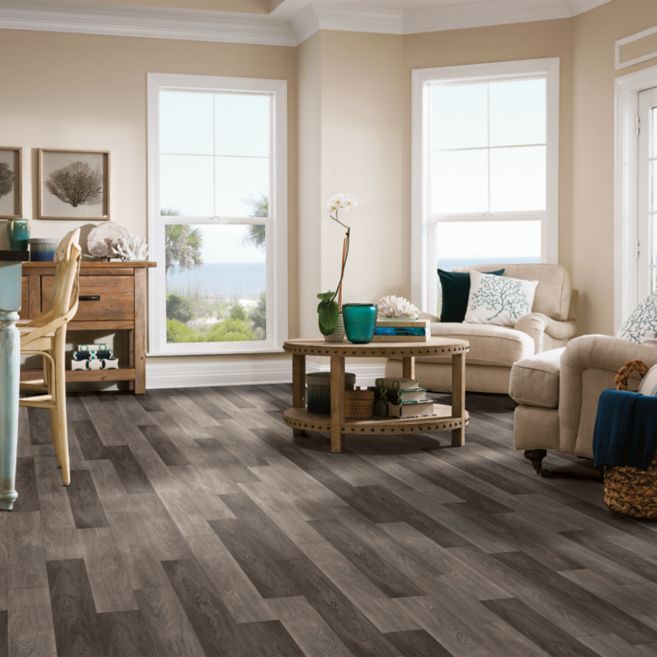
Armstrong Vinyl Plank Construction
Diamonds are the hardest substance on earth. And Armstrong’s Diamond 10 Technology infuses cultured diamonds into their products’ wear layers. Theoretically, this protects the wear layer of their vinyl planks and adds durability.
Construction options are Rigid Core, Luxury Vinyl Tile, Engineered Tile, Vinyl Sheet, and Vinyl Tile. If you’d like further clarification of how these categories differ, we recommend contacting a local flooring retailer. The same goes for pricing.
Installation options are click-lock or glue-down.
Armstrong Vinyl Plank Durability
Armstrong uses a durability rating created to test laminate floors, so this one’s a bit difficult to gauge. Most vinyl intended for commercial use is 20mil or more. To get the exact thickness of Armstrong’s products in “mil”, again, a local retailer is your best bet.
Armstrong Vinyl Plank Warranty Coverage
Most residential products come with lifetime coverage. Vivero Best includes a 20-year commercial warranty.
Armstrong Vinyl Plank Safety Ranking: 7.5/10
Armstong vinyl is made in America using domestic and globally sourced material. 28% of their vinyl is recycled content. Because recycled content can harbor VOCs, it’s a good idea to check with the manufacturer for emission ratings.
Which Armstrong Product Provides The Best Value?
Due to production size, Armstrong’s Vivero Best is just as durable as Shaw Floorte Plus (as far as wear layer thickness is concerned) but costs less.
Where Can I Purchase Armstrong Vinyl Plank?
Armstrong LVP can be purchased at box stores, nationwide chains, flooring stores…anywhere, really!
#8. Flooret
Direct-to-Consumer Vinyl Plank | $2.75‑3.95/sq. ft.
To put it mildly, flooring companies aren’t exactly well-known for the simplicity of their business models. Flooret breaks the mold. They openly adopt the direct-to-consumer strategy.
In other words, you buy their vinyl flooring directly through their website. No wholesalers or distributors take a cut. And you save money.
All of Flooret’s energy goes into one collection: Modin, which is sold directly to residential and commercial buyers.
Until recently, Flooret has flown under the radar, but their reviews are stellar. It’s only a matter of time before word gets out.
Flooret’s Vinyl Plank Offerings
Floorets’s exclusive collection, the Modin line, comes in 5 styles and 49 colors. Two durability tiers (Base and Signature) cater to residential and commercial buyers alike. You’ll pay $2.75/sq. ft. for Base and $3.95/sq ft. for Signature.
Flooret’s Vinyl Plank Construction
A UV-protected ceramic bead wear layer protects the Modin line. All planks have four-sided beveled edges. The core layer is SPC (stone polymer composite).
Imaging is EIR (embossed in register), meaning the texture perfectly matches the image layer.
Flooret’s Vinyl Plank Durability
Modin Base has a 20mil wear layer.
Modin Signature weighs in at 40mil, which is like the Incredible Hulk of vinyl flooring.
Flooret’s Vinyl Plank Warranty Coverage
A lifetime residential warranty covers both tiers of the Modin line. The commercial is 10 years for Base and 20 years for Signature.
Flooret’s Vinyl Plank Safety Rating: 9/10
Flooret is FloorScore-certified and CARB2 compliant across their entire product line.
Which Flooret Products Provide The Best Overall Value?
Flooret’s Modin collection at both durability levels is an excellent value. Savvy shoppers will love the direct-to-consumer savings.
Where Can I Purchase Flooret Vinyl Plank?
As we mentioned, Flooret can only be purchased via the Flooret website!
#9. Mannington Mills
The Best Commercial Selection | $4‑$6/sq. ft.
Mannington, as the world’s largest producer of LVT, is a flooring juggernaut. Like Mohawk, they’ve been in business for over 100 years. In 2012 they bought Amtico, a British LVT manufacturer with an excellent reputation.
Innovation defines Mannington’s brand, and its commercial line shows it. Whether you need a floor for a barbershop or an airport, Mannington vinyl flooring has you covered.
Not to suggest their residential lines are lacking. Mannington’s quality extends to both commercial and residential markets. Their Adura line alone has four different collections with varying design tweaks to suit every room in your home.
Mannington’s Vinyl Plank Offerings & Construction
All Mannington’s residential LVT sells under the Adura brand name:
- Adura Rigid is their newest offering with an SPC core designed for superior dent resistance. Styles come in either 12”x24” stone inspired tiles and 6”x48” or 7”x48” wood inspired planks. The price for both is roughly $4/sq. ft. without installation.
- Adura Max has a WPC core that’s ideal for sound dampening and insulation. The expanded polymer core is thicker and more rigid, allowing installation over existing floors. Adura Max shares the same dimensions, pricing ($4/sq. ft.), and styling as the Rigid line.
- Another WPC collection, Adura MaxApex, features large plank dimensions up to 72” in length. MaxApex is your source for eye-catching patterns if you’re looking to make a statement. Constructed of the same WPC core as the Max line, you can expect to pay $5-$6/sq. ft.
- Adura Flex is their traditional glue-down luxury vinyl tile or plank. The only difference in dimensions from the other Adura lines is an 18”x18” stone-inspired tile. As the name suggests, tiles and planks are flexible and will set you back just over $3/sq. ft.
Mannington offers 22 commercial collections in a variety of stone, wood, and abstract designs. Three choices cross over from their Amtico brand, which is still 95% manufactured in Britain.
Mannington has every design, color, and durability level you could ever need. Trust. From the best flooring for kitchens to the best flooring for basements to the best flooring for industrial factories, you’ll have plenty of options.
Retail pricing at Mannington is competitive. How much you pay will depend on your durability needs.
Mannington’s Vinyl Plank Durability
Mannington’s residential Adura line includes a 20mil wear layer.
Commercial wear layers range from 12mil (decent) up to 40mil (incredibly strong).
Mannington’s Vinyl Plank Warranty Coverage
All of Mannington’s Adura collections come with lifetime residential coverage.
Commercial warranties are vast. Thankfully, Mannington has excellent customer service. Amtico’s commercial contracts are 15–25 years.
Mannington’s Safety Rating: 9/10
All Mannington products, from hardwood to carpet to laminate to vinyl, are FloorScore certified as low in VOCs.
Which Mannington Product Provides The Best Value?
Both Adura Max and Adura Rigid are pretty excellent deals. Among the best vinyl plank flooring brands, it’s uncommon to find waterproof luxury vinyl for $4/sq. ft. that also has a 20mil wear layer and beveled edges.
Where Can I Purchase Mannington Vinyl Plank?
Mannington can be purchased at a wide array of flooring stores and online via Wayfair.
#10. Forbo Flooring
The Leader In Sustainability | $5‑8/sq. ft.
Forbo, the only Swiss manufacturer in our “best vinyl plank flooring brands” lineup, specializes in sustainable flooring for commercial and residential applications. As the world leader in linoleum (an ultra-sustainable floor covering), Forbo does their best to bring an environmental ethos to their vinyl.
To do so, Forbo focuses on green production, because there’s not much you can do to make plastic floors better for the environment.
For starters, green energy powers the manufacturing process. And they make a concerted effort to reduce transportation and cutting waste, which is recycled back into their products.
As a result, Forbo is proud to claim the honor of the “most sustainable alternative in LVT.”
Forbo’s Vinyl Plank Offerings
Forbo’s only residential line, Allura, comes in 100 stone and wood-inspired styles and eight installation choices; each installation method has a different wear layer thickness. Like all vinyl products, the cost depends on the wear layer. You can expect to pay anywhere from $5–$8/sq. ft.
Forbo breaks up their commercial products into “homogeneous” and “heterogeneous” categories. Not the catchiest descriptors, but accurate.
- Homogeneous is Forbo’s one-layer vinyl sheet construction. It comes in tons of color options and has a uniform design pattern that you might recognize from a high school auditorium or the DMV.
- Forbo’s Heterogeneous line is a multi-layered vinyl sheet that can look like anything from Hungarian Oak to the surface of Pluto. Who says vinyl floors have to be boring?
The Hetero line features a variety of functional purposes like slip-resistance, sound-dampening, or vinyl sheet loose-lay—on the odd chance you might need to improvise a quick floor covering for a large space or cover a damp cement floor.
Forbo’s Vinyl Plank Construction
In terms of installation, Forbo leaves no stone unturned. In addition to the basics like click-together and glue-down, they offer a variety of loose-lay formats.
Allura Puzzle has edges joined like puzzle pieces.
Allura Decibel, a sound-dampening loose-lay, stays in place with a tacky backing that doesn’t permanently adhere to the floor, allowing the planks to be pulled up and re-used—another nod to the environment.
Forbo’s Vinyl Plank Durability
Both Allura and their commercial wear layers range from 20‑40mil.
Forbo’s Vinyl Plank Warranty Coverage
The Allura line has a lifetime residential warranty with 10 years of coverage for commercial applications. With so many choices for commercial products, it’s best to contact the manufacturer for more details.
Forbo’s Safety Rating: 9.5/10
Pretty much all the best vinyl flooring brands are low-VOC. Forbo sources all its recycled material in-house, so safety standards are never compromised. They’re also FloorScore certified, and they guarantee all their products to be phthalate-free.
Which Forbo Product Provides The Best Value?
Anything Allura is going to have reliable quality and a great price. Forbo’s commitment to green manufacturing is a valuable investment for everyone.
Where Can I Purchase Forbo Vinyl Plank?
You can find Forbo at a number of flooring stores, including some national chains like Lowes.
#11. Cali
The Best Vinyl Plank Flooring Brand You’ve Never Heard Of | $3‑$4/sq. ft.
Or maybe you have heard of them. Mostly if you’ve spent any time investigating engineered bamboo flooring pros and cons.
That’s because Cali was initially conceived as Cali Bamboo. The idea came to the owners while on a surf trip to Hawaii, where they took a job hacking down rogue bamboo for some extra cash. These days, Cali manufactures fencing, decking, lumber, and—you guessed it—floors.
So why the heck is a bamboo flooring company showing up on the best vinyl plank brand list? Simple: they figured out how to replace sawdust with more sustainable bamboo in WPC. This clever little backdoor into the vinyl industry spawned Cali Vinyl.
We, for one, are pretty excited to welcome any new green building technique to the fake wood flooring game—especially when it’s created by one of the best hardwood flooring brands.
Oh, and by the way, Cali has the best product videos in the flooring industry by far.
Cali Vinyl Plank Offerings & Construction
All of Cali’s vinyl plank flooring comes in coastal-inspired wood patterns. Pricing is between $3 and $4/sq. ft. for the planks alone, but the company encourages you to contact them for a more realistic estimate based on the entire scope of the project.
- Cali Vinyl Pro Classic is their SPC line, boasting superior dent resistance and a sturdy rapid locking system to make installs fast and secure.
- Cali Vinyl Plus and Cali Mute Step include an attached cork underlayment for a boost in comfort and acoustic control.
- Large format planks are currently on-trend in flooring circles. And Cali delivers with their Longboards line—a nod to their surfing roots. Longboard planks also feature an attached cork underlayment.
All offerings use a proprietary EIR (embossed in register) imaging system called “Hifi” that creates an authentic wood appearance and doubles grain pattern variety for a more realistic look.
Cali Vinyl Plank Durability
All Cali’s vinyl products feature a very respectable 20mil wear layer.
Cali Vinyl Plank Warranty Coverage
Cali Bamboo is a family-owned business. They don’t offer a “lifetime” warranty, but we think 50 years is pretty generous for a 20mil wear layer—the industry standard for commercial durability.
Cali Vinyl Plank Safety Rating: 5/10
Their website doesn’t post any third-party certifications for their LVP products. And even though we’re willing to bet a company embedded in the green building sector is low-VOC, we don’t feel super comfortable giving Cali a high safety score without seeing some 3rd-party certifications. Hence the 5/10.
Which Cali Product Provides The Best Overall Value?
All of Cali’s vinyl products offer a great value. Which collection you choose is determined by your individual needs.
Where Can I Purchase Cali Vinyl Plank?
Cali vinyl is available most everywhere floors are sold, including several nationwide box stores.
Notable Vinyl Plank Flooring Brands
Below is a list of brands that just missed the cut in our lineup of best vinyl plank flooring brands. Many of them shine in most categories, but lack in others. Some just don’t have that 12mil wear layer cutoff we mentioned earlier.
#12. Miseno
Miseno sells classically styled, premium vinyl flooring in the $4–$8/sq. ft. range. You can access a group of online retailers through their website. As Miseno’s pricing and selection improve, you can expect to see them move up our roster of best vinyl plank flooring brands.
#13. Dekorman
Dekorman is a wholesale waterproof flooring brand. Their wear layers range from 12mil–28mil, and their planks average about $3/sq. ft.—a decent value for the durability they offer.
#14. Montserrat
For less than $3/sq. ft., you can buy Montserrat rigid vinyl planks in both WPC and SPC core construction. All installations are click-lock, and their vinyl products are FloorScore certified as low-VOC.
#15. Congoleum
Congoleum technically doesn’t even make vinyl floors. They only use 15% vinyl in their predominantly limestone products. Which is cool, because it means their resilient flooring has virtually zero VOCs.
Resilient flooring without the plastic? Yes, please. They also make 16-inch-wide sheets, so even substantial residential spaces can be covered without seams.
#16. NuCore
NuCore is sold exclusively through Floor & Decor. Some styles come with attached cork underlayment and a 22-mil wear layer. Warranties cover a limited lifetime for residential use and up to 15 years for commercial applications. “Limited” being the operative word here—NuCore flooring reviews have mentioned more than a few durability issues.
Not horrible for around $3/sq. ft.—but as always, box-store brands are a bit of a dice-roll as far as quality is concerned.
#17. SmartCore
Continuing with popular box-store brands: SmartCore is Lowes’ in-house LVP.
And as box-store brands go, SmartCore flooring reviews would suggest that it’s decent. That’s probably because COREtec makes Smartcore, and COREtec, as you know, is owned by Shaw. Good heavens.
Anyways, Lowes’ SmartCore Pro line is SPC, and the Ultra collection is WPC. Lowe’s sells Smartcore Ultra for about $3.50/sq. ft. Smartcore Pro is about 50 cents more.
#18. LL Flooring
LL, formerly known as Lumber Liquidators, is a GIANT of a flooring company—hence earning a spot on this list. Because to be honest, quality is not really their selling point.
Some of the company’s products have a bad rep for safety standards. If you’re interested in one of their styles, it’s a good idea to check with the manufacturer about VOC content. They’ve had some issues with that—and with honesty—in the past…
#19. LifeProof
LifeProof is Home Depot’s in-house LVP brand. Its wear layers range from 6mil–22mil. Home Depot includes a lifetime residential warranty on all LifeProof products—but if LifeProof flooring reviews are any indication, this is probably a brand to skip.
So why did it end up on our list of the best vinyl plank flooring brands? Simple—it’s popular. Although given its quality, that clearly has more to do with Home Depot being so widespread than anything else.
#20. Home Decorators Collection
Home Decorators Collection is another brand sold exclusively at Home Depot—and we included it here for the same reason as LifeProof. Expect lower quality, weak warranties, and prices in the $2–$3/sq. ft. range.
#21. TrafficMaster
Last and quite possibly least, TrafficMaster is another Home Depot offspring. Buy at your own risk. It’ll cost you a little more than $1/sq. ft. and will undoubtedly end its short life in a landfill, as is the case with TrafficMaster laminate flooring.
Still Undecided? Here are A Few More Brands to Consider:
- Build Surfaces
- Tarkett
- Achim
- Baroque
- Beaulieu
- Coreluxe
- Duraclic
- EarthWerks
- Eternity
- Fusion Hybrid
- Global Gem
- Hallmark Courtier
- HSC Woodland Creek
- Nova Core
- Nuvelle WPC
- Reward
- Rigid Core
- SFI Luxury Vinyl
- Sono by InHaus
- Stainmaster
- Moduleo
- MultiCore
Vinyl Plank Flooring FAQs
What Is the Best Thickness for Vinyl Plank Flooring?
We’ve covered this in more detail above, but 12mil is a safe baseline for residential. That said, you can get away with thinner stuff in low-traffic spaces. 20mil or thicker is best for commercial applications.
How Long Will Vinyl Plank Flooring Last?
Wear layer thickness determines the longevity of vinyl flooring. As is the case with all the best vinyl plank flooring brands, wear layers are measured in mil, a measurement unit equal to a thousandth of an inch. The warranty will also reflect the wear layer thickness. The function of the space intended for installation also plays a huge role.
Are There Different Grades of Vinyl Plank Flooring?
Absolutely. Many different kinds of core layer composites and wear layer infusions vary amongst manufacturers. But mainly, the thickness and composition of the wear layer determines the “grade,” or durability, of the product.
What Is the Best Waterproof Vinyl Plank Flooring?
All of the best vinyl planks are technically waterproof in and of themselves. However, seam construction, the addiction of underlayments, and the installer’s skill determine the overall permeability of a floor covering.
Can You Put Heavy Furniture on Vinyl Plank Flooring?
Especially when compared to softwoods (check out some Douglas fir flooring pros and cons for more info on that), all vinyl planks are pretty resilient.
If you have to put something cumbersome on your vinyl floors, shop around for SPC (stone polymer composite). Furniture coasters are always a good idea, especially with budget products with thin wear layers.
Does Vinyl Plank Flooring Scratch Easily?
Vinyl plank flooring’s scratch resistance all depends on the thickness and composition of the wear layer. Any products over 12mil (like you’ll find in the best vinyl plank flooring brands above) will be reasonably scratch resistant.
Which is Better: Vinyl Plank or Vinyl Sheet?
It all depends on the intended use.
That said, vinyl sheets are usually thinner and need potentially harmful adhesives for installation. Vinyl sheets also tend to come in thinner wear layers, which explains the lower cost.
The most significant benefit of vinyl sheet is fewer seams, which can be great when you need an ultra-waterproof floor covering for applications like mudroom flooring.
Planks are generally more expensive, durable, and authentic in appearance.
Do You Need Underlayment for Luxury Vinyl Plank Flooring?
It’s undoubtedly a good idea. Especially if the room is damp or you have cement subflooring. Luckily, most of the best vinyl plank flooring brands come with cork or foam underlayment already attached.
Is Vinyl Plank Better Than Laminate?
Vinyl and laminate have their respective pros and cons. One isn’t necessarily better than the other.
What Is the Average Cost to Install Vinyl Plank Flooring?
For one thing, it’s way less than the cost to replace carpet with hardwood. But you can replace that dingy carpet with vinyl that looks exactly like hardwood for about $7/sq. ft. Again, we covered this in detail above.
Can You Mop Vinyl Plank Flooring?
Yes, you can! A damp mop with mild dish soap is all you need to keep the finish on your LVP fresh.
Is LVP With A Wood Core Really Waterproof?
Yes! The “wood” (actually a filtered sawdust called wood flour) is wholly encased in vinyl, making it waterproof.
Is Vinyl More Waterproof Than Laminate?
Overall yes. Waterproof laminate does exist, but all the best vinyl plank flooring brands manufacture 100% waterproof LVP.
What Is The Best Way To Clean Vinyl Plank Flooring?
All you need to clean vinyl flooring is a broom, a vacuum without a rotating brush, or “beater bar,” and a damp mop.
Harsh chemicals and cleaning agents will damage your floors. Splash a little dish soap or shampoo in a bucket of warm water, and you’re golden.
Are Their Ways You Shouldn’t Clean LVP?
Some vacuums have a rotating brush that will scuff up LVP. Also: harsh chemicals or fancy cleaning agents could potentially damage the wear layer of your vinyl flooring.
Can You Vacuum Vinyl Plank Flooring?
Most certainly. Although, again, it can’t be the type of vacuum with a rotating brush, or “beater bar,” because they can damage the wear layer, resulting in a hazy film that obscures the design layer.
Can You Steam Clean Vinyl Plank Flooring?
Not necessary! A damp mop is all you need. And depending on the thickness of the wear layer, the hot steam could damage the wear layer or top-coat.
Some Brands Recommend “Walk-Off” Mats. What Are They And Why Should You Use Them?
“Walk-off mat” is industry jargon for “doormat.” We all know what doormats do. The idea is to keep grit off the floors to protect the wear layer.
Can Luxury Vinyl Plank Flooring Be Installed Over Radiant Heat?
As long as the planks are rigid, installing them over radiant heat shouldn’t be a problem. When in doubt, check with a flooring retailer near you to make sure.
Is Vinyl Plank Flooring Green?
Yes and no. Most of the best vinyl plank flooring brands implement green production methods. And salt, a sustainable material, is mixed with polymers to create vinyl. But LVP is challenging to recycle, and the result is a plastic product that will ultimately end up in a landfill.
Can LVP/LVT Be Installed In Areas That Are Not Climate Controlled?
It all depends on the product you choose and the climate you install it in. For various reasons (like color fading), most vinyl flooring isn’t generally intended to be used as outdoor flooring.
There are some specialized outdoor vinyl flooring options, but not a ton of them—and many are only suitable for 3-season rooms at most.
What Else Is Covered Or Excluded In LVP Warranties?
Most warranties cover manufacturer defects limited to the original buyer. Anything else—such as pet accidents or a game of s-k-a-t-e in the kitchen—is on you. However, some of the best vinyl plank flooring brands (shoutout to Mohawk!) have warranties specifically designed for pet owners.
*****************************************************************************************************************************************************************************
Read more at the original post: https://www.flooringstores.com/blog/best-vinyl-plank-flooring-brands/

Leave a Reply